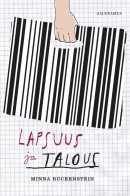Tag: economics
Minna Ruckenstein: Lapsuus ja talous [Childhood and the economy]
28 August 2014 | Mini reviews, Reviews
 Lapsuus ja talous
Lapsuus ja talous
[Childhood and the economy]
Helsinki: Gaudeamus, 2013. 186 pp.
ISBN 978-952-495-294-1
€33, paperback
In her book the cultural anthropologist and researcher Minna Ruckenstein examines the Finnish and Western economy from an unusual angle, looking at it from the point of view ofchildren mainly under the age of 12. The preconceptions of educators about a deep divide between children and the market economy do not necessarily correspond to reality; the economic activities of children are diverse. They include, for example, reciprocity and exchange as a value creator that supports social relations. Children have a different relationship to money and its valorisation from that of adults. The difference between work and play is blurred, and children’s forms of paid work and their experience of it are also not as unambiguous as has been traditionally thought. During recent decades commercial children’s culture has become an increasingly obvious part of the child’s life; information technology has created new forms of participation, and children are not only targets of active marketing but also producers. This interesting book shows that childhood and the economy have closer and more nuanced links than is generally assumed.
Translated by David McDuff
Reindeer yoga?
15 July 2013 | This 'n' that

Human yoga wheel. Photo: Wikimedia
While Finnish politicians, just back at Parliament after their summer break, twiddle their thumbs in frustration as the nation faces darkening prospects for economic growth, Finland is being admired across the pond.
The Atlantic magazine took a long look at ‘the secrets of Finland’s success with schools, moms, kids – and everything’ (July 2013).
Olga Khazan reports: Finns enjoy long vacations, better school scores, unemployment insurance, paid parental leaves, cheap child care, education and medical services, and low infant mortality rates.
‘All of this adds up to the stress equivalent of living in what is essentially a vast, reindeer-fur-lined yoga studio.’
Whoa! Are we that happy in Finland? More…
Markku Kuisma & Teemu Keskisarja: Erehtymättömät. Tarina suuresta pankkisodasta ja liikepankeista Suomen kohtaloissa 1862–2012 [The infallible ones. The story of the great bank war and Finland’s commercial banks, 1862–2012]
13 December 2012 | Mini reviews, Reviews
 Erehtymättömät. Tarina suuresta pankkisodasta ja liikepankeista Suomen kohtaloissa 1862–2012
Erehtymättömät. Tarina suuresta pankkisodasta ja liikepankeista Suomen kohtaloissa 1862–2012
[The infallible ones. The story of the great bank war and Finland’s commercial banks, 1862–2012]
Helsinki, WSOY, 2012. 496 p., ill.
ISBN 978-951-0-39228-7
€ 38.80, hardback
Historians Markku Kuisma and Teemu Keskisarja’s lively book tells the story of Finland’s commercial banks, from the establishment of the first one in 1862. A recurrent theme in the book is the competition between the two largest. With their relations to and allies in the business world the banks have had an important social and political influence in the country. The commercial banking institutions have had more prominence than others, and the directors have often been strong personalities. Most of the emphasis in the book is placed on the final decades of the 20th century. In the 1980s the financial markets were deregulated, and the boom of the ‘crazy years’ of the bank war was accelerated by share trading and cornering. In 1995 the recession caused by the banking crisis led to the merger of the two largest commercial banks. A few years later this new institution merged with a Swedish one, and the large new bank Nordea subsequently expanded to neighbouring countries. The age of large national commercial banks in Finland was over.
Translated by David McDuff
Olli Rehn: Myrskyn silmässä [In the eye of the storm]
23 November 2012 | Mini reviews, Reviews
 Myrskyn silmässä
Myrskyn silmässä
[In the eye of the storm]
Helsinki: Otava, 2012. 320 p.
ISBN 978-951-1-26250-3
€ 30.50, hardback
Finland’s Olli Rehn currently serves as European Commissioner for Economic and Monetary Affairs and vice-president of the European Commission. He had previously occupied the post of Commissioner for European Union Enlargement. During the long economic crisis that began in Greece is increasingly affecting the whole of Europe, he has been ‘in the eye of the storm’, looking for ways to overcome the difficulties of member states. In this recent ‘interim report’ aimed at the general public, Rehn describes his personal experiences against the background of the crisis during its troubled and at times extremely hectic moments, and also presents recipes for overcoming it, taking into account both the Finnish point of view as well as broader global connections. He sees the success of the EU as being dependent on the creation of a banking union, the strengthening of European economic and monetary co-operation and the reinforcement of the green economy. The book opens up a fascinating perspective on the core of the wielding of power within the EU. Rehn writes fluently – but as an official, without revealing all that has taken place behind the scenes.
Translated by DavidMcDuff
Marginal notes
4 June 2009 | Essays, Non-fiction

Fast food for thought? Culture meets business. – Illustration: Joonas Väänänen
Extracts from a collection of writings, Ulkona (‘Outside’, Siltala, 2008)
Literature – and ‘serious’ writing in particular, the kinds of texts we publish in Books from Finland – is often seen as lost, irrelevant, pushed out to the edge of mainstream popular culture. But, argues Hannu Raittila, the margin is actually the area of greatest freedom. Everything worthwhile happens there – and business would do well to imitate art, rather than the other way round
It is easy to see culture as a marginal part of society, if viewed from an economic perspective. It is easy to see literature, for its part, as a marginal phenomenon even when compared with other areas of culture – pop music, for example. More…
